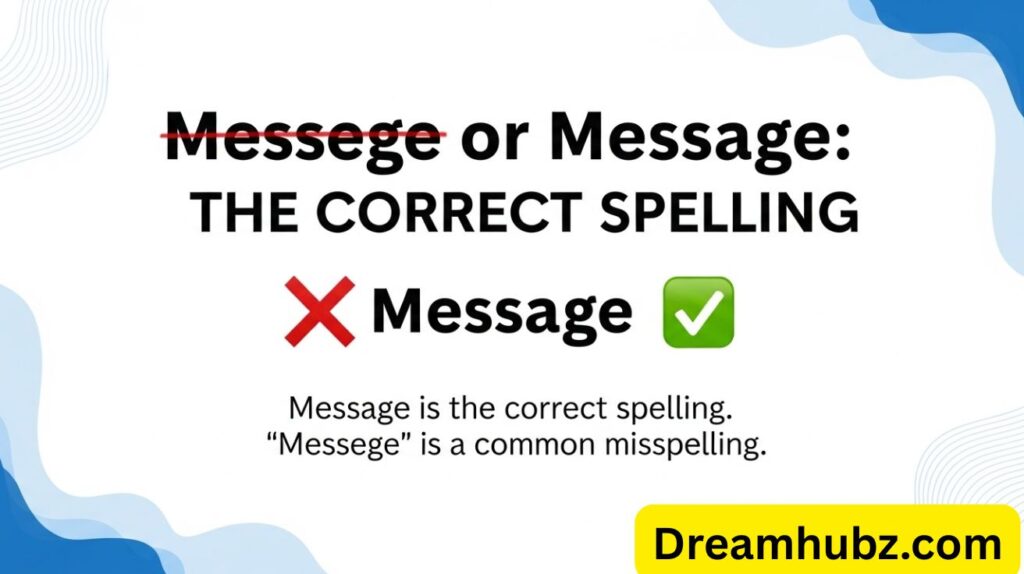Messege or Message: The Correct Spelling
The words messege or message often confuse people. The truth is simple. Message is the correct spelling. Messege is always a mistake.
Many people still write it wrong. This can look unprofessional. It can also confuse the reader. Small mistakes often leave a big impression.
The word message means information shared with someone. It can be spoken, written, or sent digitally. You may send a text message, email, or voicemail. But remember, it is always spelled message.
What Is the Correct Spelling: “Messege” or “Message”?

The correct spelling of message is simple: it is always spelled message. The version “messege” is simply wrong. There is no dictionary, grammar rule, or style guide in English that supports “messege” as correct. So, if you have ever wondered, “is messege correct?” the answer is no.
The word “message” comes from Middle English and Old French origins, where it referred to something that is sent or delivered. Today, it is widely used in American English and British English with the exact same spelling. No variation exists between the two. Whether you are writing an email, sending a text, or leaving a note, you must always write “message,” never “messege.”
When people confuse messege or message, it is usually due to quick typing, phonetic mistakes, or simply not paying attention. Unfortunately, spelling errors in formal communication can affect how others view your attention to detail.
Definition of “Message”
The message meaning is very clear. A message is any piece of information communicated from one person to another. This can happen through writing, speaking, or digital channels like email or text. According to English dictionaries, a message is defined as “a communication in writing, in speech, or through symbols delivered from one person to another.”
For example, when you leave a voicemail for your colleague, you are leaving them a message. When you send a short note to your friend about dinner plans, that is also a message. In digital life, almost every interaction, from a Facebook chat to a professional email, is a type of message. The meaning is universal, but the spelling is fixed: always “message,” never “messege.”
Correct Usage Example
To understand this better, let us look at a correct usage example.
“I left you a message about tomorrow’s meeting. Please confirm if you received it.”
Here, the spelling is accurate, and the sentence is clear. This is how professionals expect the word to appear in writing. Correct spelling shows competence, accuracy, and respect for your reader.
Incorrect Usage Example
Now, let us look at an incorrect usage example.
“I left you a messege about tomorrow’s meeting. Please confirm if you received it.”
This single mistake changes the impression of the sentence. While your reader will still understand the meaning, the error signals carelessness. In situations like job applications, academic writing, or business proposals, this one slip could cost you credibility.
Why Does “Messege” Appear So Often?
Despite being a clear mistake, many people still use “messege.” Understanding why helps us prevent it.
Phonetic Confusion
One major reason is phonetic confusion in spelling. The word “message” is pronounced with a soft “a,” almost sounding like “mess-ij.” Some people assume there should be an extra “e” in the middle because of how it sounds. Unlike words that follow clear English spelling rules, this word tricks learners and even native speakers into misplacing the vowel.
Typing Errors
Another reason is simple typing mistakes. Many of us type quickly on phones or computers. In such speed, it is easy to hit the wrong vowel key and write “messege” instead of “message.” This is a classic case of typo vs misspelling. A typo is an accidental error due to typing fast, while a misspelling means the person truly believes the wrong form is correct.
Autocorrect Problems
Modern devices are designed to help with spelling, but sometimes they cause confusion. Autocorrect mistakes happen when your device automatically changes “messege” to an entirely different word like “massage.” While spell-check is useful, it can sometimes overlook the right context. This is why grammar and spell-check tools are helpful but not always perfect.
Psychological Tendencies
Studies in psychology explain that humans often skip over familiar mistakes. Your brain tends to auto-correct what you read, so even if you write “messege,” you may not notice it because your brain sees it as “message.” This is why proofreading tips always recommend taking a short break before reviewing your writing. A fresh mind catches errors more easily.
The Impact of Spelling Errors on Professionalism

In American workplaces, attention to detail in writing is a highly valued skill. Making spelling mistakes like writing “messege” instead of “message” can have several negative effects. First, it decreases your credibility. If you cannot spell common words correctly, readers may question your overall competence. Second, it reduces trust. Employers and clients want to work with people who care about accuracy. Third, it leaves a poor first impression. For example, a resume filled with common English word errors may get rejected instantly.
Here is a table that highlights the professional impact of such errors:
| Impact | Description | Example |
| Decreased Credibility | Readers doubt accuracy and skills | Writing “messege” in a formal email |
| Reduced Trust | Clients question reliability | Proposal with spelling mistakes |
| Poor First Impressions | Employers lose confidence | Resume with “definately” instead of definitely |
| Missed Opportunities | Errors block promotions or deals | Report with repeated spelling issues |
As the saying goes: “Details matter. Misspelled words can make even the best ideas look sloppy.”
Preventing Errors: How to Avoid Writing “Messege” Instead of “Message”
The good news is that avoiding this mistake is easy if you adopt a few strategies.
Proofread Your Writing
The most reliable way to avoid mistakes is to proofread carefully. Even a quick review can help you spot spelling mistakes. The importance of proofreading cannot be overstated. In professional settings, proofreading is expected, whether it is a business proposal, an academic essay, or even a simple email.
Use Digital Tools
Modern grammar and spell-check tools make writing much easier. Programs like Grammarly, Microsoft Word, and Google Docs underline mistakes instantly. They highlight when you type “messege” and suggest the correct “message.” However, you should not depend fully on these tools because they can sometimes make autocorrect mistakes.
Practice Commonly Confused Words
Another helpful strategy is to practice frequently misspelled words. Many people confuse words like:
| Incorrect Spelling | Correct Spelling | Why the Mistake Happens |
| Messege | Message | Phonetic confusion or typo |
| Recieve | Receive | Misuse of “i before e” rule |
| Seperate | Separate | Misunderstanding vowel placement |
| Definately | Definitely | Mispronunciation of the silent “i” |
By reviewing these examples regularly, you train your brain to always write them correctly.
Slow Down While Typing
Finally, slowing down your typing can reduce mistakes. While speed is important, writing clarity and professionalism matter more. Taking an extra second to type carefully ensures your writing is polished and error-free.
Common Misspellings and Their Fixes
Spelling errors are not unique to the word “message.” Many English words confuse people. Below is a quick guide to some common misspellings in English and their fixes:
| Incorrect | Correct | Reason for Error |
| Messege | Message | Extra vowel added |
| Definately | Definitely | Misheard pronunciation |
| Occured | Occurred | Dropped double letter |
| Seperate | Separate | Wrong vowel placement |
| Recieve | Receive | Misapplied spelling rule |
When writing, always double-check such tricky words to avoid embarrassment.
The Role of Tools in Avoiding Mistakes
Autocorrect Advantages and Limitations
Autocorrect is useful for catching basic errors. If you type “messege,” your phone or computer may instantly change it to “message.” However, if “messege” accidentally gets saved in your dictionary, autocorrect may ignore it. In some cases, it may even replace it with an unrelated word, leading to confusion.
Proofreading Tools
Beyond autocorrect, advanced tools like Grammarly, ProWritingAid, and Hemingway Editor are extremely helpful. These tools do more than correct common English word errors. They also suggest improvements in tone, clarity, and flow. For professional writing in the USA, such tools can make the difference between looking polished and looking careless.
The Importance of Spelling in Professional Communication
Good spelling is not just about language; it is about professionalism. When you confuse messege or message the correct spelling, it can harm your credibility. In the USA workplace, employers often judge applicants by their writing skills. Even a small error may suggest a lack of attention to detail in writing.
Spelling errors also affect how people perceive your clarity. Using the wrong form, such as writing “messege,” makes your writing look rushed. Correct spelling shows care, precision, and professionalism. Whether in business emails, academic essays, or digital chats, understanding the correct spelling of message improves how others respond to your communication.
Why Do People Confuse Messege vs Message?
The mix-up between messege vs message is more common than people think. One reason is phonetic confusion in spelling. The word “message” sounds like it has an “e,” so many people mistakenly insert it. Others confuse it due to weak knowledge of English spelling rules, where vowels sometimes appear unpredictable.
Another reason is simply typing too quickly. Many people commit typo vs misspelling mistakes while texting or emailing. Devices may also cause autocorrect mistakes, replacing “messege” with “massage.” Because of these factors, misspellings often go unnoticed until someone points them out. That is why proofreading tips are important in everyday writing.
Case Study: The Cost of a Spelling Mistake

Consider a case study of a job applicant who submitted a resume with the phrase, “Please see my messege for details.” This one error caused the recruiter to question their communication skills. In a competitive market, even spelling errors in formal communication can cost opportunities. Precision is often linked to professionalism in the USA.
Another case involved a business proposal where the writer repeatedly used “messege.” The client assumed the company lacked writing clarity and professionalism. Such examples prove that spelling mistakes are not small errors. They can directly impact trust, credibility, and opportunities. Correct spelling, especially of common words, is a simple but powerful professional skill.
Common English Word Errors to Avoid
Confusing messege or message the correct spelling is only one example of common errors. Many writers struggle with tricky words like receive vs recieve, separate vs seperate, and definitely vs definately. These are classic frequently misspelled words that appear even in professional documents. Learning their correct forms improves your writing immediately.
Here is a quick fact: according to studies, the most common misspelling in emails is “definately.” This shows why importance of proofreading cannot be ignored. By reviewing your work or using grammar and spell-check tools, you can catch these mistakes before sending your message. Correct spelling always creates stronger impressions.
Practical Tips to Master the Correct Spelling of Message
The easiest way to remember the correct spelling of message is to practice it daily. Write short notes or reminders using the word “message” until it becomes natural. Training your brain this way reduces the chance of writing “messege.” Learning through repetition is a proven method for mastering common misspellings in English.
You should also slow down when typing. Rushing often leads to typos that look like real errors. Combine this with tools like Grammarly or Google Docs to check your work. These proofreading tips ensure that you always deliver polished communication. Over time, spelling “message” correctly will become automatic and effortless.
FAQ,s
What is correct, message or messege?
The correct spelling is message; messege is always wrong.
What is the difference between a message and a massage?
A message is communication, while a massage is a physical therapy for the body.
How do you spell message as in text?
It is always spelled message, even in texting or digital communication.
What do you mean by a message?
A message is information shared through speech, writing, or electronic means.
Conclusion
The debate between messege or message is not really a debate at all. The only correct form is message. Writing “messege” is simply a mistake, whether it comes from typing fast, misunderstanding pronunciation, or relying too much on autocorrect. While small, this mistake can damage your professionalism, credibility, and clarity.
The best way to avoid such errors is to build strong spelling habits. Proofread everything you write, use digital tools wisely, practice tricky words like receive vs recieve, separate vs seperate, and definitely vs definately, and slow down when typing.







